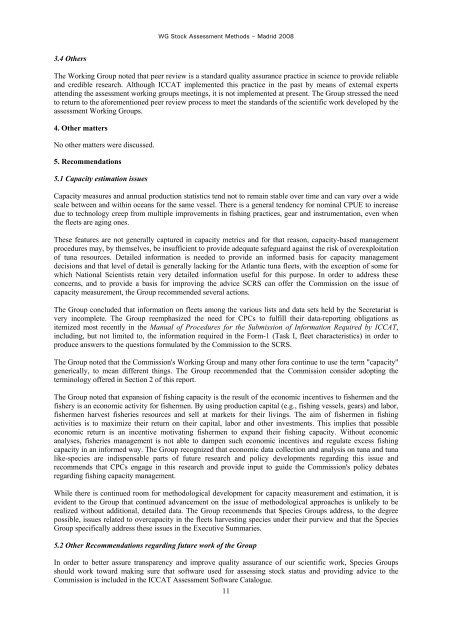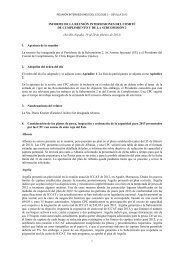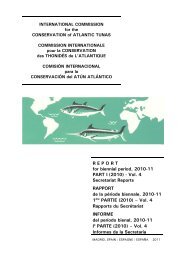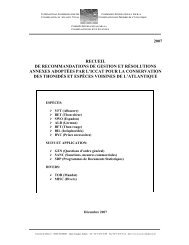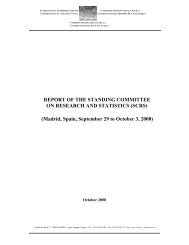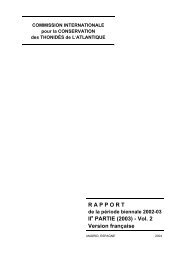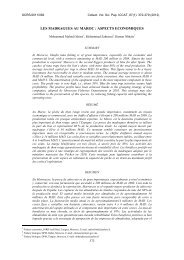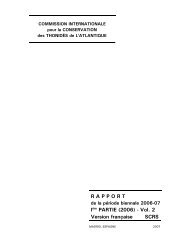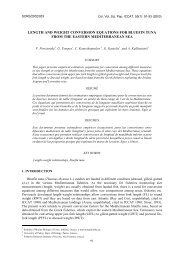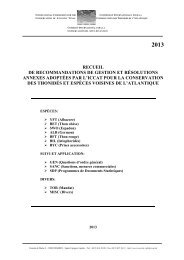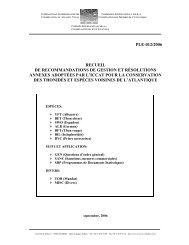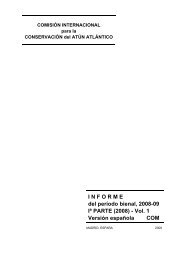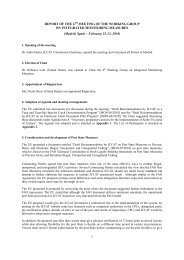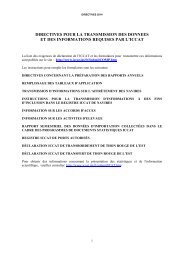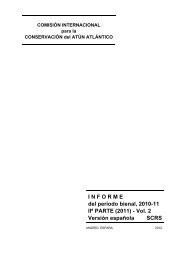REPORT OF THE 2008 ICCAT WORKING GROUP ON STOCK ...
REPORT OF THE 2008 ICCAT WORKING GROUP ON STOCK ...
REPORT OF THE 2008 ICCAT WORKING GROUP ON STOCK ...
You also want an ePaper? Increase the reach of your titles
YUMPU automatically turns print PDFs into web optimized ePapers that Google loves.
WG Stock Assessment Methods – Madrid <strong>2008</strong>3.4 OthersThe Working Group noted that peer review is a standard quality assurance practice in science to provide reliableand credible research. Although <strong>ICCAT</strong> implemented this practice in the past by means of external expertsattending the assessment working groups meetings, it is not implemented at present. The Group stressed the needto return to the aforementioned peer review process to meet the standards of the scientific work developed by theassessment Working Groups.4. Other mattersNo other matters were discussed.5. Recommendations5.1 Capacity estimation issuesCapacity measures and annual production statistics tend not to remain stable over time and can vary over a widescale between and within oceans for the same vessel. There is a general tendency for nominal CPUE to increasedue to technology creep from multiple improvements in fishing practices, gear and instrumentation, even whenthe fleets are aging ones.These features are not generally captured in capacity metrics and for that reason, capacity-based managementprocedures may, by themselves, be insufficient to provide adequate safeguard against the risk of overexploitationof tuna resources. Detailed information is needed to provide an informed basis for capacity managementdecisions and that level of detail is generally lacking for the Atlantic tuna fleets, with the exception of some forwhich National Scientists retain very detailed information useful for this purpose. In order to address theseconcerns, and to provide a basis for improving the advice SCRS can offer the Commission on the issue ofcapacity measurement, the Group recommended several actions.The Group concluded that information on fleets among the various lists and data sets held by the Secretariat isvery incomplete. The Group reemphasized the need for CPCs to fulfill their data-reporting obligations asitemized most recently in the Manual of Procedures for the Submission of Information Required by <strong>ICCAT</strong>,including, but not limited to, the information required in the Form-1 (Task I, fleet characteristics) in order toproduce answers to the questions formulated by the Commission to the SCRS.The Group noted that the Commission's Working Group and many other fora continue to use the term "capacity"generically, to mean different things. The Group recommended that the Commission consider adopting theterminology offered in Section 2 of this report.The Group noted that expansion of fishing capacity is the result of the economic incentives to fishermen and thefishery is an economic activity for fishermen. By using production capital (e.g., fishing vessels, gears) and labor,fishermen harvest fisheries resources and sell at markets for their livings. The aim of fishermen in fishingactivities is to maximize their return on their capital, labor and other investments. This implies that possibleeconomic return is an incentive motivating fishermen to expand their fishing capacity. Without economicanalyses, fisheries management is not able to dampen such economic incentives and regulate excess fishingcapacity in an informed way. The Group recognized that economic data collection and analysis on tuna and tunalike-species are indispensable parts of future research and policy developments regarding this issue andrecommends that CPCs engage in this research and provide input to guide the Commission's policy debatesregarding fishing capacity management.While there is continued room for methodological development for capacity measurement and estimation, it isevident to the Group that continued advancement on the issue of methodological approaches is unlikely to berealized without additional, detailed data. The Group recommends that Species Groups address, to the degreepossible, issues related to overcapacity in the fleets harvesting species under their purview and that the SpeciesGroup specifically address these issues in the Executive Summaries.5.2 Other Recommendations regarding future work of the GroupIn order to better assure transparency and improve quality assurance of our scientific work, Species Groupsshould work toward making sure that software used for assessing stock status and providing advice to theCommission is included in the <strong>ICCAT</strong> Assessment Software Catalogue.11


